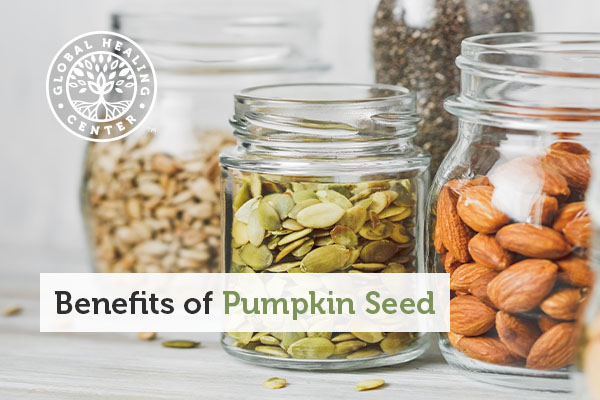
Seeds can be a fantastic source of nutrition and pumpkin seeds are among the best. The pumpkin is a member of the squash family and it's native to North and Central America. Its seeds have been used by Native Americans for centuries to support urinary and digestive health. Just a single serving provides highly nutritious and necessary minerals such as magnesium, zinc, potassium, and iron. As an added bonus, pumpkin seeds are packed with potent antioxidants.
Benefits of Pumpkin Seeds
Simply put, the excellent nutritional profile of pumpkin seeds has not only made them an integral part of natural health, but it's also garnered the attention of researchers who have looked deeper into the health benefits of pumpkin seeds. What have they found? Read on...
1. Support for BPH
Pumpkin seeds have been recommended by natural and alternative health practitioners to support prostate health and BPH (benign prostate hyperplasia).
The German Council E (Germany’s equivalent to the U.S. Food and Drug Administration) approved pumpkin seed for this use in 1985. And a 2009 Korean study isolated pumpkin seed oil to evaluate their effect on BPH. They reported that the pumpkin seeds promoted normal urinary flow and participants reported improved quality of life.[1]
Prostrex® Raw Herbal Extract provides superior nutritional support for the prostate, and contains organic pumpkin seeds as well as saw palmetto and other herbs.
2. Helps Balance Blood Sugar
Pumpkins are a potent source of phenols and antioxidants. Pumpkin promotes balanced blood sugar levels because of their bioactive proteins.[2,3]
3. May Deter Harmful Organisms
The US Pharmacopeia listed pumpkin seeds as a remedy for intestinal, harmful organisms until 1936.[4] Does that mean it really didn't work? Not quite, tests have shown that pumpkin seeds protect against harmful organisms.[5]
4. Nutritional Support for Excess Cell Proliferation
Let's be clear that pumpkin seeds are not a cure for cancer. However, it can't be ignored that pumpkin seeds have positive, nutritional effects for those with breast and prostate cancers.
One study found a significant association between pumpkin seed consumption and promoting breast health.[6] Another study further indicated that the lignans in pumpkin seeds offers breast health support.[7]
It doesn't stop there. With regards to prostate health, a study examined a supplement containing pumpkin seeds and other compounds reported the positive potential for dealing with human prostate cells that have gone awry.[8]
5. Great for the Heart
The powerful phytochemicals and omega-3 fatty acids contained in pumpkin seeds have led researchers to explore its benefits for cardiovascular health.
Diets rich in omega-3 fatty acids, particularly alpha-linolenic acid, offer protective effects against ventricular fibrillation, a primary cause of cardiac death.[9]
6. Promotes Healthy Cholesterol Levels
Pumpkin seed oil promotes healthy cholesterol levels. The effects of the pumpkin seed go beyond this one improvement — in addition to healthy cholesterol levels, taking pumpkin seeds also promotes balanced blood pressure.
7. Post-Menopausal Benefits
For women who have reached menopause, pumpkin seeds can influence the severity of hot flashes and also ease head and joint discomfort.[10]
Eating Pumpkin Seeds
Pumpkin seeds are tasty by themselves, and they go great in a trail mix or salad. Pumpkin seed butter is another option that is delicious and lets you enjoy pumpkin seeds in new ways — try spreading it on celery! When shopping for pumpkin seeds, look for an organic, GMO-free option. If purchasing whole pumpkins, choose organic if possible.
References (10)
- Hong H, Kim CS, Maeng S. Effects of pumpkin seed oil and saw palmetto oil in Korean men with symptomatic benign prostatic hyperplasia. Nutr Res Pract. 2009 Winter;3(4):323-7. doi: 10.4162/nrp.2009.3.4.323. Epub 2009 Dec 31.
- Kwon YI, Apostolidis E, Kim YC, Shetty K. Health benefits of traditional corn, beans, and pumpkin: in vitro studies for hyperglycemia and hypertension management. J Med Food. 2007 Jun;10(2):266-75.
- Teugwa CM, Boudjeko T, Tchinda BT, Mejiato PC, Zofou D. Anti-hyperglycaemic globulins from selected Cucurbitaceae seeds used as antidiabetic medicinal plants in Africa. BMC Complement Altern Med. 2013 Mar 18;13:63. doi: 10.1186/1472-6882-13-63.
- NYU Langone Medical Center. Pumpkin Seed. (last accessed 2013-08-26)
- Li T, Ito A, Chen X, Long C, Okamoto M, Raoul F, Giraudoux P, Yanagida T, Nakao M, Sako Y, Xiao N, Craig PS. Usefulness of pumpkin seeds combined with areca nut extract in community-based treatment of human taeniasis in northwest Sichuan Province, China. Acta Trop. 2012 Nov;124(2):152-7. doi: 10.1016/j.actatropica.2012.08.002. Epub 2012 Aug 11.
- Zaineddin AK, Buck K, Vrieling A, Heinz J, Flesch-Janys D, Linseisen J, Chang-Claude J. The association between dietary lignans, phytoestrogen-rich foods, and fiber intake and postmenopausal breast cancer risk: a German case-control study. Nutr Cancer. 2012;64(5):652-65. doi: 10.1080/01635581.2012.683227. Epub 2012 May 16.
- Richter D, Abarzua S, Chrobak M, Vrekoussis T, Weissenbacher T, Kuhn C, Schulze S, Kupka MS, Friese K, Briese V, Piechulla B, Makrigiannakis A, Jeschke U, Dian D. Effects of Phytoestrogen Extracts Isolated from Pumpkin Seeds on Estradiol Production and ER/PR Expression in Breast Cancer and Trophoblast Tumor Cells. Nutr Cancer. 2013 Jul;65(5):739-45. doi: 10.1080/01635581.2013.797000.
- Jiang J, Eliaz I, Sliva D. Suppression of growth and invasive behavior of human prostate cancer cells by ProstaCaid™: mechanism of activity. Int J Oncol. 2011 Jun;38(6):1675-82. doi: 10.3892/ijo.2011.996. Epub 2011 Apr 4.
- Risti-Medi D, Risti G, Tepsi V. [Alpha-linolenic acid and cardiovascular diseases]. Med Pregl. 2003;56 Suppl 1:19-25.
- Gossell-Williams M, Hyde C, Hunter T, Simms-Stewart D, Fletcher H, McGrowder D, Walters CA. Improvement in HDL cholesterol in postmenopausal women supplemented with pumpkin seed oil: pilot study. Climacteric. 2011 Oct;14(5):558-64. doi: 10.3109/13697137.2011.563882. Epub 2011 May 5.
†Results may vary. Information and statements made are for education purposes and are not intended to replace the advice of your doctor. If you have a severe medical condition or health concern, see your physician.



